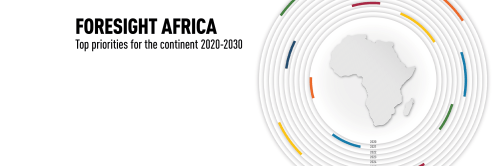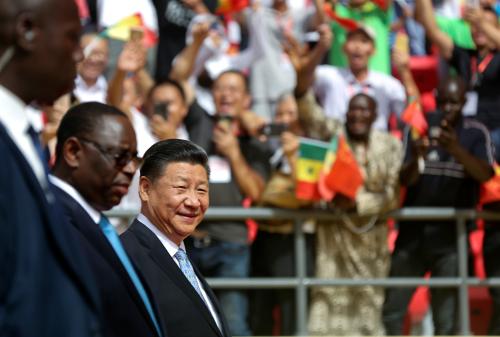The United Kingdom hosts African leaders for investment summit
This week, the United Kingdom hosted the U.K.-Africa investment summit in London. The summit, attended by Prime Minister Boris Johnson and 21 African leaders, focused on the U.K.’s post-Brexit trade and investment relationship with African countries. Several investment deals were announced on the sidelines of the summit including $400 million in deals signed by the U.K. government-backed CDC Group. Private sector deals included a $218 million investment by Diageo, a brewing company in Kenya, and a $411 million deal by Savannah Petroleum to buy oil and gas assets in Nigeria. Kenya also launched a green bond on the London Stock Exchange worth $40 million.
Notably, as the U.K. goes through the Brexit process, the country must remake trade agreements it had been party to under the European Union. Until the end of 2020, U.K.-Africa trade will be governed by European Union trade rules. Currently, Africa represents about 2.5 percent of the U.K.’s annual trade, and South Africa, Nigeria, and Algeria account for more than half of this amount. In an effort to smooth trade relations during the Brexit process, the U.K. has already signed trade continuity agreements with 12 African countries (mostly in southern Africa) and is in negotiations with several others including Egypt, Ghana, and Kenya. These trade continuity agreements will maintain the current EU trading conditions between these countries and the U.K. after Brexit to minimize disruption. The U.K. will also keep the EU’s generalized scheme of preferences, allowing 35 African countries special tariff exemptions.
Turkey’s increased engagement
Earlier this week, Turkish President Recep Tayyip Erdogan announced that Somalia has invited Turkey to explore for oil in the waters off the Somali coast. Turkey has been very responsive to the needs of Somalia, including flying nine people—including three Turkish nationals—injured in Saturday’s bombing in Mogadishu to Turkey for treatment.
Somalia’s invitation to Turkey follows its controversial November maritime delimitation deal with Libya, allowing Turkey to explore the gas reserves off Libya’s coast.
For more on Turkey’s stepped-up engaged with Africa (as well as that of other new partners), see Yun Sun’s Foresight Africa 2020 viewpoint, “Unpacking the engagement of nontraditional actors in Africa: China and other emerging players.”
Africa’s richest woman, Isabel dos Santos, charged with fraud
On Wednesday, January 22, Angola’s justice system charged Isabel dos Santos, Africa’s richest woman and daughter of former Angolan president José Eduardo dos Santos, with numerous economic corruption crimes. The charges, according to Prosecutor General Helder Pitta Gros, include “money laundering, influence peddling, harmful management … forgery of documents, among other economic crimes.”
The charges against dos Santos were followed by the International Consortium of Investigative Journalists’ January release of the “Luanda Leaks,” a collection of over 700,000 documents that reveal two decades of embezzlement within a network of more than 400 companies connected to dos Santos and her husband. Nearly a quarter of those companies exist in tax havens, fed by government funding funneled out of the natural resource-rich country her father led for 38 years. Dos Santos’ business ventures, often facilitated by her father, included stakes in diamonds and oil—both natural resources in Angola—as well banking and mobile phone sectors. The revelation of these crimes that have enriched the elites of a country where two-thirds of the population lives under the poverty line has elicited global criticism and fury.
After a court order by Angolan authorities froze her assets on New Years’ Eve, dos Santos denounced the charges as “politically motivated” and a “witch hunt.” She remains abroad, but could be summoned by arrest warrant back to Luanda to face justice if she does not return of her own accord. Valued at more than $2 billion, dos Santos is the continent’s first female billionaire.
Several U.S. companies, including McKinsey & Company, Boston Consulting Group, and PwC, have consulted and performed accounting services for her business empire for years. Now, critics are accusing these firms of willfully ignoring the warning signs of illegal and unethical activities that fostered the siphoning of hundreds of millions of public dollars from Angola.
Comoros election
Earlier this week, Comoros held an election during which incumbent President Azali Assoumani’s party, the Convention for the Renewal of the Comoros (CRC), won 17 out of the country’s 24 parliamentary seats. Two of the seats also went to parties currently in the president’s coalition. Notably, opposition parties boycotted the election. According to the electoral commission, a second round of voting on February 23 will determine the remaining five seats (as of this posting, the results have not been announced). Last year, in a controversial referendum also boycotted by the opposition, the island nation passed a constitutional amendment allowing Assoumani to run for another term.






Commentary
Africa in the news: UK-Africa Investment Summit, Turkey’s increased engagement, and Angola fraud scandal
January 25, 2020